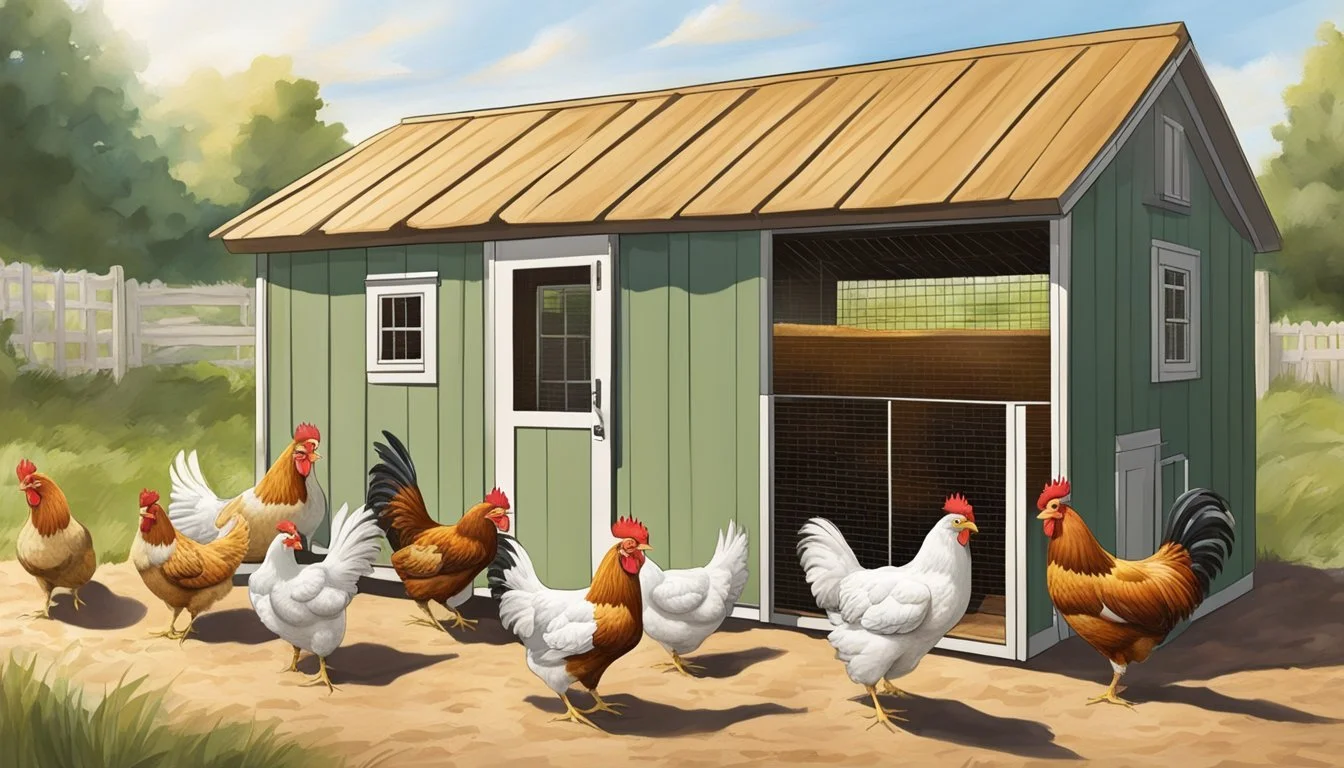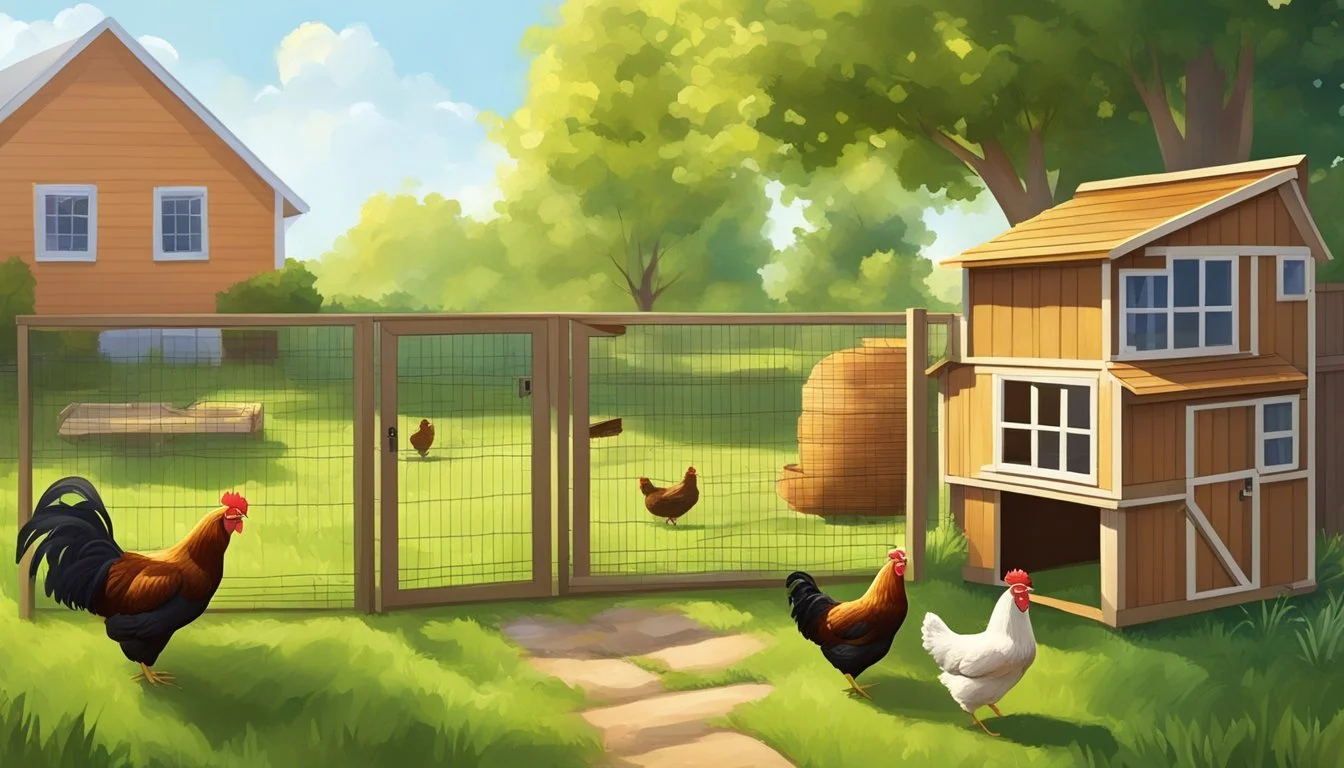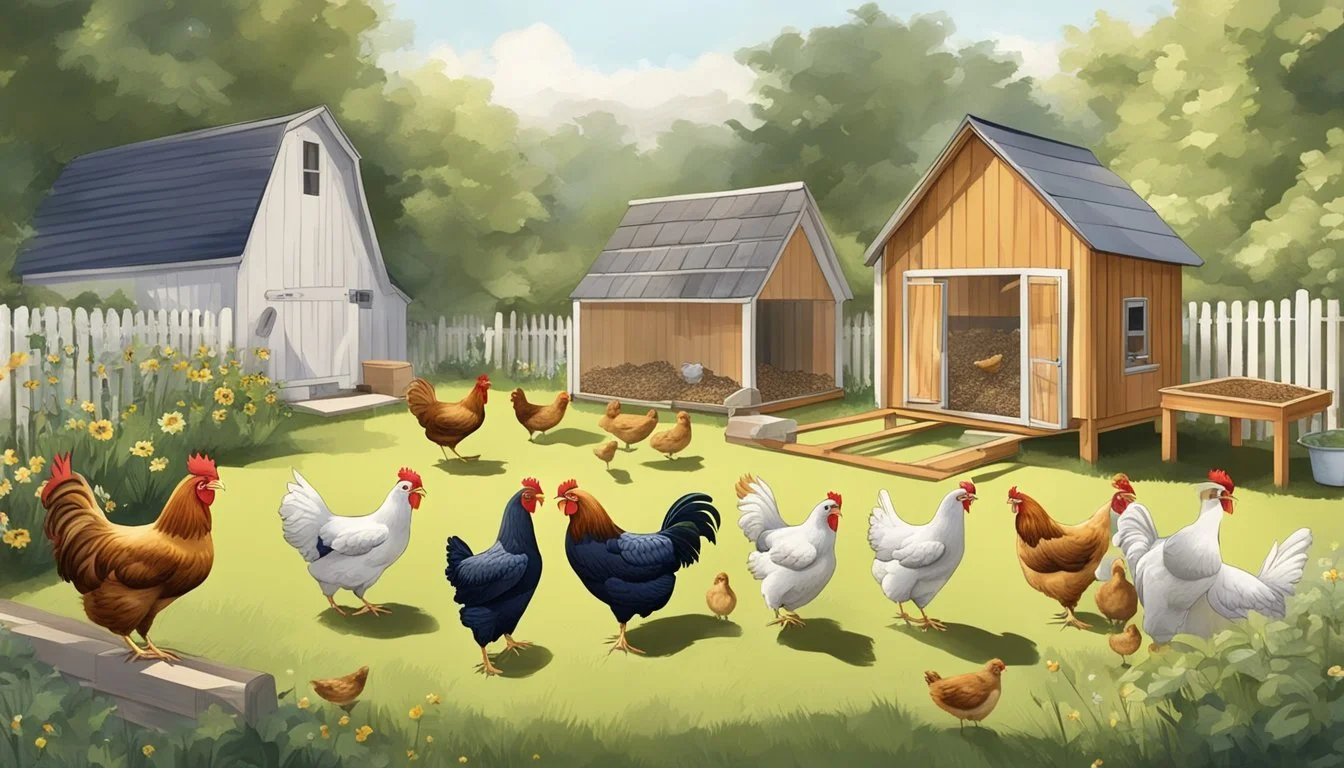Keeping Backyard Chickens in Olathe, KS
A Comprehensive Guide to Local Ordinances and Best Practices
In Olathe, Kansas, residents have the opportunity to engage in a rewarding practice of raising backyard chickens. This activity offers a way to connect with nature, understand the roots of food, and enjoy the pleasures of fresh eggs. The local regulations permit a maximum of four hens, providing a framework that balances personal hobby farming with community harmony. Such ordinances are crafted to ensure neighbors are not disturbed, hence roosters, known for their loud crowing, are not allowed within city limits.
The interest in backyard chickens has grown as individuals seek sustainable and local food sources. Chickens not only contribute to a household's food supply but also offer pest control and an excellent source of natural fertilizer. The city of Olathe's clear guidelines on chicken-keeping highlight a trend towards urban agriculture, reflecting a growing desire to reconnect with traditional food production methods in a modern setting.
Understanding Local Ordinances
When keeping backyard chickens in Olathe, KS, residents must navigate specific municipal regulations to ensure compliance with local animal ordinances.
Permit Requirements
Individuals interested in keeping chickens must first apply for a permit. The application process is a mandatory step to legally raise backyard poultry within city limits.
Number of Chickens Allowed
The city of Olathe allows residents to keep up to four (4) hens. This limitation helps maintain a balance within residential areas, ensuring that neighbors are not overwhelmed by large flocks on adjacent properties.
Restrictions on Roosters
To maintain peace and prevent noise disturbances within neighborhoods, roosters are strictly prohibited. No exceptions to this rule are indicated by the Olathe ordinances, emphasizing the community’s commitment to minimizing potential nuisances.
Setting Up Your Chicken Coop
Creating an appropriate space for backyard chickens in Olathe, KS, entails careful planning and consideration of local regulations. The coop must offer shelter, space, and protection to meet the chickens' needs effectively.
Choosing the Right Location
When setting up a chicken coop, the location must adhere to Olathe's local ordinance, which requires a minimum yard setback of six feet from property lines for animal enclosures. The chosen spot should be well-ventilated, have good drainage, and be protected from extreme weather and predators. Access to sunlight is beneficial, but the coop should also have some shaded areas.
Coop Design and Size
In Olathe, the size of the chicken coop should accommodate the number of chickens, with generally recommended space of about 2-3 square feet per chicken inside the coop, and about 8-10 square feet per chicken in an outdoor run. The coop should be sturdy, with materials that ensure longevity and ease of maintenance.
Essential Features for Coops
A proper chicken coop includes several critical features:
Nesting Boxes: Typically, one nesting box for every three to four hens is sufficient.
Roosts: Provide adequate roosting space for chickens to sleep comfortably, allowing for 8-12 inches per bird.
Coops and Runs: Both the coop and any attached runs need protection from predators with secure fencing and covers.
Proper ventilation is necessary to remove moisture and ammonia, so the inclusion of windows or vents is a must. The design should facilitate easy cleaning to maintain a sanitary environment for the chickens.
Chicken Care Basics
Raising chickens in Olathe, KS requires understanding key practices for daily maintenance, ensuring the health and wellness of the flock, and managing stress levels among chickens. Attention to these care basics helps maintain a healthy and productive backyard flock.
Daily Maintenance
Feeding: Chickens should have constant access to a balanced feed appropriate for their age, whether chicks, pullets, or mature chickens. Provide a mix of layer pellets and grains for adults, along with clean, fresh water daily.
Coop Cleaning: Regularly change bedding material and remove droppings. A clean coop minimizes health risks and discourages pests.
Health and Wellness
Preventative care: Regular check-ups help identify health issues before they become serious.
Physical Inspections: Regularly examine chickens for signs of illness or injury, which may include changes in behavior or appearance.
Parasite Control: Treat for mites, lice, and internal parasites with appropriate medication.
Vaccinations: Stay informed about recommended vaccinations to prevent common poultry diseases.
Dealing with Stress in Chickens
Minimize changes: Chickens thrive on routine. Avoid unnecessary changes to their environment to prevent inducing stress.
Identification: Recognize signs of stress, which can include reduced egg production, feather picking, or changes in eating habits.
Environment: Provide ample space, perches, and nesting areas to reduce crowding and stress-related behaviors.
Benefits of Raising Backyard Chickens
Raising backyard chickens in Olathe, KS, connects residents with multiple advantages, from enjoying fresh produce to enhancing environmental sustainability. These birds not only contribute to a homeowner's food supply but also offer educational insights and support eco-friendly practices.
Fresh Eggs
A primary benefit of raising chickens is the access to fresh eggs. Eggs collected from one's own backyard are often perceived as more flavorful and nutritious compared to store-bought counterparts. They can be a staple of home cooking, providing a reliable source of protein.
Educational Opportunities
Chickens serve as an excellent educational resource, especially for children. They teach responsibility through daily care routines and offer a hands-on experience in understanding the life cycle of living creatures. Additionally, the art of maintaining a chicken coop can spark creativity and ingenuity.
Sustainability and Environment
Keeping chickens aligns well with sustainable living practices. They play a vital role in waste reduction by consuming kitchen scraps while providing fertilizer through their droppings. This natural compost can enrich backyard gardens, promoting a cycle of growth and sustainability.
Community and Legal Considerations
When keeping backyard chickens in Olathe, KS, residents must navigate local regulations and maintain a good relationship with their community. It's essential to understand state laws, secure permits, and engage in constructive dialogue with neighbors and local forums.
Engaging with Neighbors
Residents considering backyard chickens should first communicate with their neighbors. This dialogue can help address concerns about potential noise or odors. It's important to maintain transparency and demonstrate a commitment to cleanliness and noise reduction, thereby fostering a harmonious community environment.
Understanding State Laws
In Kansas, municipalities have specific ordinances that govern the keeping of backyard chickens. For Olathe residents, the following points are crucial:
Number of Chickens: A maximum of four chickens is allowed.
Roosters: Keeping roosters is prohibited to avoid noise disturbances.
Permits: Residents must apply for a permit to keep backyard chickens.
Adhering to these regulations ensures that residents are in compliance with local laws and helps to promote responsible pet and land stewardship.
Participating in Local Forums
Involvement in local forums and online communities can be a valuable resource for backyard chicken enthusiasts. By participating in forums, residents can gain insights into best practices, connect with others for support and advice, and stay informed about any changes to local laws or regulations.
Keeping backyard chickens in Olathe is a rewarding experience that requires careful attention to community and legal considerations. By following these guidelines, residents can enjoy the benefits of backyard chickens while being responsible community members.
Advanced Topics in Chicken Rearing
When delving into the more complex aspects of chicken rearing in Olathe, KS, enthusiasts will encounter challenges in breeding, coop upgrades, and the processing of chickens for meat. It requires a deeper understanding of genetics, construction, and ethical slaughtering practices.
Breeding and Chicken Genetics
Successful breeding hinges on a sound grasp of chicken genetics. Breeders must consider Chicken Breeds, focusing on traits such as egg production, temperament, and climate resilience. A table for popular breeds in Olathe and their attributes might look like:
Breed Egg Production Temperament Climate Resilience Rhode Island Red High Docile Hardy Plymouth Rock Moderate Friendly Moderate Silkie Low Gentle Sensitive
Selecting the right pairings can lead to improved flocks over successive generations.
Upgrading Your Coop
Upgrades to Chicken Coops should prioritize security, weather resistance, and space per bird. An upgraded coop might include:
Insulation: Essential for Olathe's variable weather, ensuring chickens stay warm in winter and cool in summer.
Ventilation: Proper airflow prevents moisture buildup and maintains air quality.
Extended Roaming Area: Chickens benefit from more space, reducing stress and promoting health.
Owners should evaluate the costs and benefits of each upgrade, selecting those which offer the most significant improvements in the welfare of their flock.
Slaughtering Chickens for Meat
When raising chickens for meat, understanding the slaughtering process is vital. Individuals must comply with local regulations regarding the humane treatment of animals. Key points include:
Quick and Humane: The method should induce the least stress and pain to the chicken.
Sanitation: All equipment and surfaces must be kept clean to prevent contamination.
Processing: Knowing how to properly eviscerate and prepare the chicken for cooking is crucial.
People considering this undertaking must respect the sacrifice of the bird and strive for a process that acknowledges the value of life.
Choosing the Right Chicken Breed
In Olathe, KS, selecting the optimal breed of chicken for your backyard coop depends on several factors such as climate adaptability, egg production, and temperament.
Climate Considerations
Kansas experiences a variety of weather conditions; hence, hardy breeds like Production Reds, which are a cross between the New Hampshire Red and Rhode Island Red, are well-suited for the region. They are acclaimed for their excellent brown egg-laying capabilities.
Jersey Giants: Known for their large size and docile nature, they are a choice for families due to their gentle temperament. Despite their size, they can mingle with other breeds without issues.
Egg Production and Purpose
When prioritizing egg production:
Layer Breeds: Production Reds and other prolific layers are advisable for those who value a consistent supply of eggs.
For those interested in the appearance or breed novelty:
Ornamental Breeds: Such as Silkies or Polish can add visual interest to a flock, though their egg laying may be less robust.
Space and Management
Space: Larger breeds, such as Jersey Giants, require more space than smaller breeds.
Management: Pullets (young hens) usually require less management than roosters, which may be subject to local regulations due to noise.
Behavioral Traits
A peaceful flock is crucial. Bantam varieties can be a good choice for those with limited space and looking for less dominance behavior, but it is essential to consider that roosters may exhibit more aggressive tendencies regardless of breed.
In summary, Olathe residents should select a chicken breed that aligns with their objectives, whether it be egg production, ease of care, or breed characteristics. Conducting further research on specific breeds and consulting local regulations are advised steps before making a decision.
Troubleshooting Common Issues
In keeping backyard chickens in Olathe, KS, residents often encounter specific challenges related to pests, weather, and health. This section will provide practical advice for managing these common issues effectively.
Pest Management
Pests present a continuous challenge for chicken keepers. Common pests include mites, lice, and rodents. To combat these:
Mites and Lice: Implement regular coop cleanings and dust baths containing diatomaceous earth, which acts as a natural insecticide.
Rodents: Secure feed in metal containers and seal coop openings to prevent access.
Weather Challenges
Olathe's weather can range from hot summers to cold winters, posing risks of heat stress and frostbite.
Heat Stress: Ensure chickens have access to shade, ample water, and ventilation during the summer months. Frozen treats can help cool them down.
Cold Protection: In winter, provide a draft-free coop with proper insulation, while avoiding overheating which can cause health issues.
Health Concerns
A chicken's health is influenced by its environment, diet, and stress levels. Key health concerns include:
Nutrition: Feed a balanced diet and provide grit for digestion.
Stress: Minimize by maintaining a routine, limiting handling, and providing a spacious environment.
Disease Prevention: Vaccinate if recommended and isolate new or sick chickens to prevent the spread of disease.
Resources and Further Reading
For those considering or currently keeping backyard chickens in Olathe, Kansas, a wealth of resources is available to support your endeavors. From comprehensive books and guides to interactive online communities and local workshops, enthusiasts have numerous options to acquire the knowledge needed for successful chicken keeping.
Books and Guides
"Storey's Guide to Raising Chickens" by Gail Damerow is a widely recommended book offering extensive information on chicken care, from hatchlings to egg production and health.
The Chicken Health Handbook, also by Gail Damerow, provides in-depth details on maintaining the well-being of backyard chickens.
Online Communities and Forums
BackYard Chickens (www.backyardchickens.com) is a robust online community with a dedicated section for participants from Olathe, Kansas. Members can exchange advice, share experiences, and stay updated on local regulations.
IOS platforms offer various apps and forums such as Poultry Keeper Forum and Chicken Forum, which provide platforms for discussions and sharing insights with fellow chicken enthusiasts.
Local Chicken Keeping Workshops
Olathe's local cooperative extension often hosts workshops for both the beginner and advanced chicken keeper, focusing on best practices in chicken husbandry and complying with local ordinances.
Community centers or local farms sometimes offer hands-on sessions where individuals can learn directly from experienced keepers in the Olathe area.






